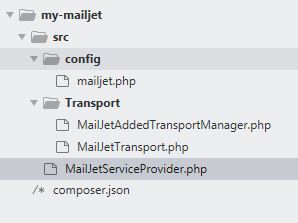Similar Posts
Upload to FTP with PHP
$fp = fopen(‘https://www.example.com/pdfdoc’, ‘r’); $user = “sammy”; $pass = “password”; $ftp_server = “192.168.10.10”; //should be wrapped in try catch to properly handle errors $ftp_conn = ftp_ssl_connect($ftp_server); $login = ftp_login($ftp_conn, $user, $pass); ftp_chdir($ftp_conn, ‘path/to/folder’); //can also use ftp_pwd ftp_pasv($ftp_conn, true); //passive mode ftp_fput($ftp_conn, “mydocument.pdf”, $fp, FTP_BINARY); fclose($fp); ftp_close($ftp_conn); Above code can be used to upload a…

Custom Mail Driver for Laravel
Out of the box Laravel supports many mail drivers, such as smtp, sendmail, mailgun, log, array, etc. But what if you wold like to use a mail service that Laravel does not have a driver for, such as Mailjet? You can create a custom driver for that service. This article will describe how to create…
Adding Email Headers in Laravel Application
Adding email headers in Laravel application is quite simple. SwiftMessage can be customized using withSwiftMessage method of Mailable base class: https://laravel.com/docs/8.x/mail#customizing-the-swiftmailer-message However you have to remember to do it every time you create a new “mailable” class. Some mail APIs require you to put a special header each time you send an email. In this…
Running Artisan Command as a Separate PHP Process in Laravel
In Laravel framework you can create commands and call them from php application. One command can call another command, and another command, and so on. But if an exception is thrown in one of the commands in this chain the whole chain breaks. In order to avoid this problem and run each artisan command as…